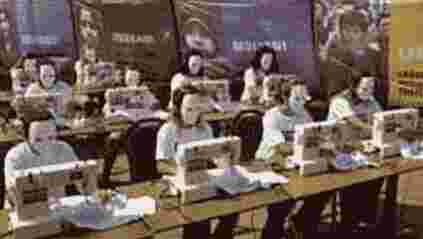Exploitation Poverty,
blame the employers.
It was Karl Marx (1818-1883) who first noted that if a rich minority owned the farmland, factories and other means of production that the majority needed to use in their working for a living, then the rich would tend to increase their own wealth by paying poverty wages to the majority working for them. This worker exploitation poverty has certainly affected some societies.
While certainly Marx severely attacked such exploitation poverty, he maybe somewhat perversely actually did see some significant good in human poverty as driving social revolution. Hence he says in his Poverty of Philosophy, 1847 Chapter 2 ;
"they see in poverty nothing but poverty, without seeing in it the revolutionary, subversive side, which will overthrow the old society."
So poverty causes discontent and discord that leads to revolutions against such poverty.
Revolutions may have largely involved those living below the poverty line and human progress may indeed have involved some key revolutions broadly in this Marxist manner, but undoubtedly most human progress has actually been gradual and by those with some leisure and often even with some wealth. The progressiveness of social revolutions generally involves only their temporarily de-ossifying a society that has become frozen by social rules preventing further progress.
So in one society a longer stretch of its history to Marx might involve ;
some eg 1,000 years of steady hunting-based progress then eg 200 ossified years of little progress then a short period of social revolution
then eg 300 years of steady farming-based progress then eg 100 ossified years of little progress then a short period of social revolution
then eg 100 years of steady industry-based progress then eg 50 ossified years of little progress then a short 'final revolution' involving the ending of all worker exploitation and all poverty.
( However as to the detail, more recent history seems to indicate that it may well be that the final means of production is not Industry but Robotry. With information workers becoming the final proletariat ? )
Also, besides the exploitation of workers in one country, an additional aspect of worker exploitation poverty also noted by Karl Marx is the exploitation by rich countries of poor countries. So governments and business in Europe and America often pay poverty prices for goods or services produced for them by poor countries in Asia and other regions. This may help reduce poverty in the rich countries, possibly only by increasing poverty in poor countries ? And really, having poor to exploit in fact chiefly encourages exploiter inefficiency and low productivity, which retards progress in overall wealth growth.
When richer countries allow immigration from poorer countries, the migrants generally receive the lowest wages - and accept that as still allowing them to send some essential money to their poorer family back home. However, the current world recession is causing such family remittances from overseas workers to fall sharply at present as more migrants lose their jobs. And richer countries having poor immigrants chiefly encourages employer inefficiency and low productivity, which retards their progress overall.
Of course there was more to the ideas of Karl Marx on poverty, and he was not alone in considering worker exploitation poverty. But the rich generally can't own everything so some will avoid working directly for them, and so avoid being directly exploited by them - though they can still be subject to some indirect exploitation. Also some employers may pay higher wages than others, and they will attract more workers and better workers so it is possible that the employer paying higher wages may make bigger profits than similar employers paying lower wages. Of course this depends on the particular case and if wages are much higher then they may have to tolerate lower profits.
The rich have often benefited economically in proportion to their exploitation of the poor, but this is not necessarily so. Undoubtedly at times the rich generally do breed poverty by such exploitation, but equally certainly they have at times helped in reducing poverty - though more often their help has been of limited real benefit.
# One indicator of extreme worker exploitation is the continued abuse of child labour in many countries - for more see
Child Labour, SARD/FAO pdf 426 kb

Exploited workers ?